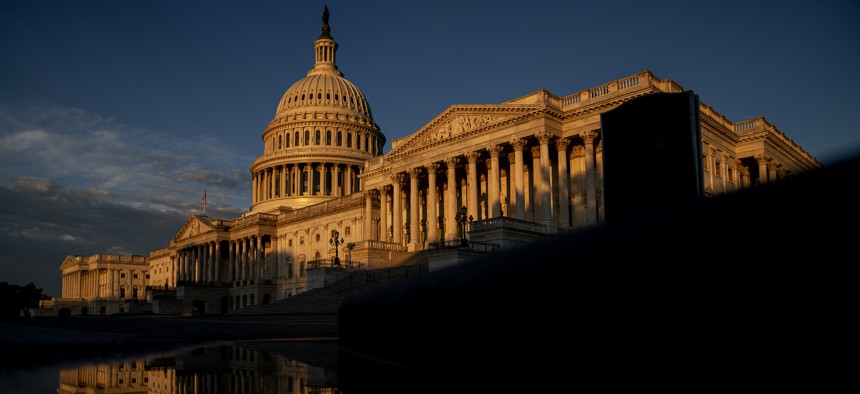States and Localities Score Wins in New Covid-19 Spending Deal

The U.S. Capitol building in Washington, D.C. Stefani Reynolds/Bloomberg
There aren’t any clawbacks of state aid and the package would extend greater latitude for spending ARPA dollars on infrastructure.
A $10 billion, bipartisan deal for emergency Covid-19 funding that congressional lawmakers unveiled Monday includes some significant wins for states and localities.
First, states have escaped the prospect of having billions in American Rescue Plan Act funds rescinded to pay for the new spending package, after an earlier proposal called for taking back about $7 billion from 30 states to do so. And, if the deal is enacted as is, states and local governments would gain greater flexibility to use their ARPA funds on infrastructure projects, something they have been calling for.
The deal, announced by Senate Majority Leader Chuck Schumer, would provide funding requested by the Biden administration to keep up the nation’s Covid-19 public health response, helping with costs like vaccines, tests, therapeutics and other supplies. To gain approval, the measure still must still pass both chambers of Congress.
Included in the compromise was a bipartisan bill proposed by Sens. John Cornyn, a Texas Republican, and Alex Padilla, a California Democrat, in which states and localities would be able to use up to $10 million, or 30%—whichever amount is greater—of their payments under ARPA’s main state and local aid program on a variety of transportation projects, and on the types of spending allowed under the Community Development Block Grant program.
Associations representing cities, states and counties pushed for the provision to be included in the spending measure Congress passed last month to fund the federal government for the remainder of this fiscal year, and were disappointed it was left out.
Schumer expressed dissatisfaction that the emergency Covid aid deal is far less than the $22.5 billion the administration requested and does not include $5 billion for global virus funding. But he still framed the agreement as a positive development.
“This $10 billion Covid package will give the federal government – and our citizens – the tools we need to continue our economic recovery, keep schools open and keep American families safe,” Schumer, a New York Democrat, said in a statement.
The fact that congressional negotiators turned to other unspent ARPA and CARES Act dollars—rather than ARPA aid slated for states—was no doubt a relief for states.
Susan Frederick, senior federal affairs counsel for the National Conference of State Legislatures, said in an email that the association is still reviewing the bill, but “appreciates the bipartisan agreement reached today that keeps the State and Local Fiscal Relief funds contained in ARPA intact and permits greater flexibility for infrastructure and disaster relief purposes.”
(Provisions in the legislation sponsored by Cornyn and Padilla would open new options for spending ARPA dollars on disaster relief expenses as well.)
Congressional negotiators had initially looked to claw back funds promised to states to help pay for the emergency Covid funding. House Democrats last month, while negotiating the $1.5 trillion omnibus spending bill for the current fiscal year, briefly agreed to Republican demands to take back ARPA dollars from states.
The idea was pulled amid an outcry from some Democratic lawmakers and state and local officials. Instead, Democrats in the House removed the Covid funding measure from the larger fiscal bill and began negotiations over passing it as separate legislation.
But as negotiators tried to reach agreement on the standalone measure, Senate Republicans who have raised concerns about how states are spending ARPA dollars, continued to press for some money to be taken from states. A Senate Democratic aide, however, told Route Fifty last week that Democrats would not go along.
Kery Murakami is a senior reporter for Route Fifty.
NEXT STORY: In a State Renowned for Its Budget Mess, Glimmers of a Turnaround






